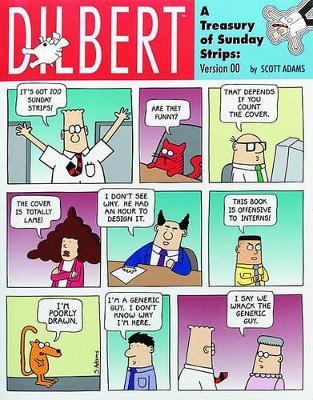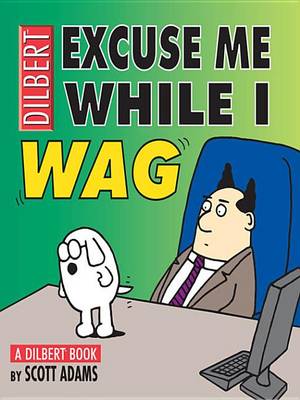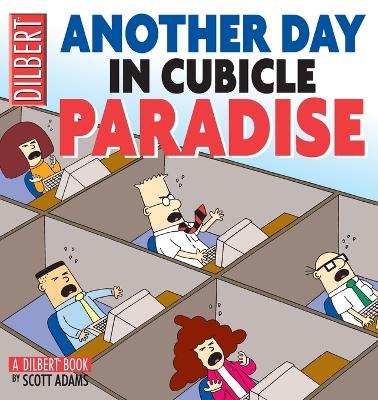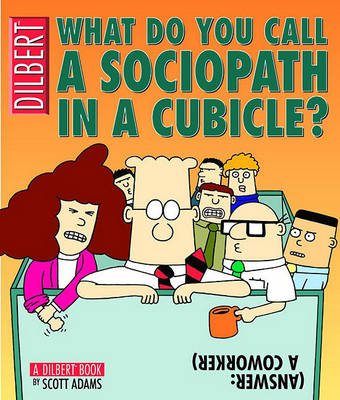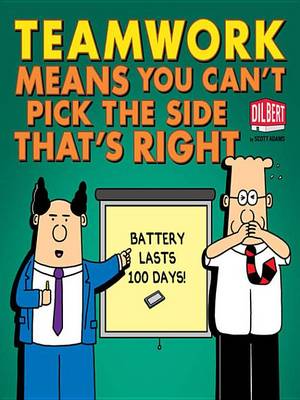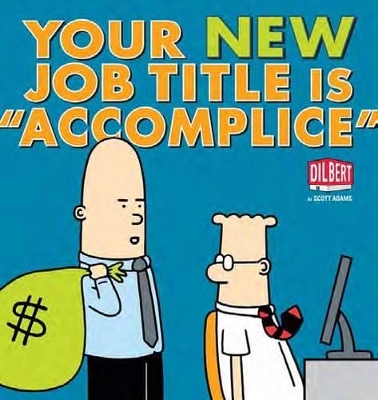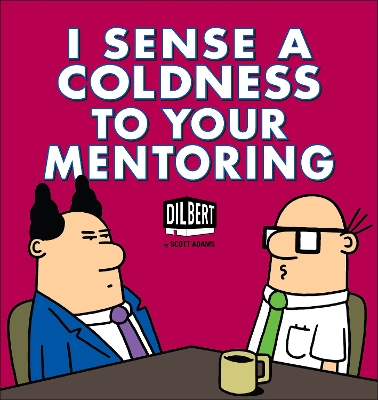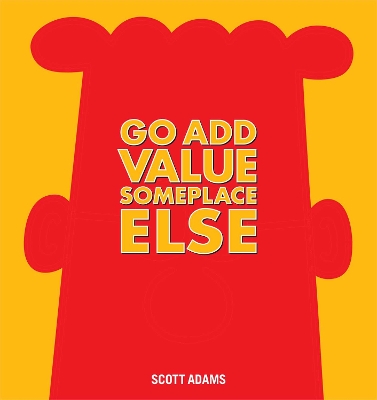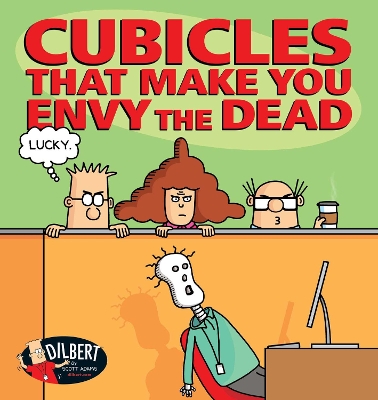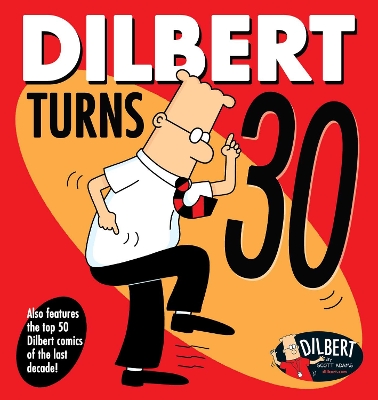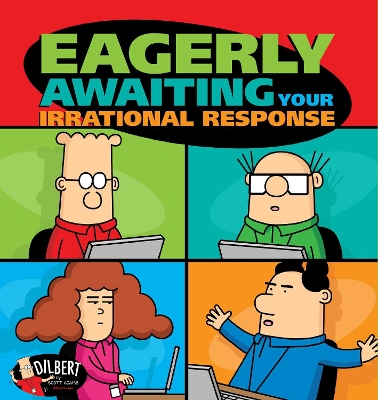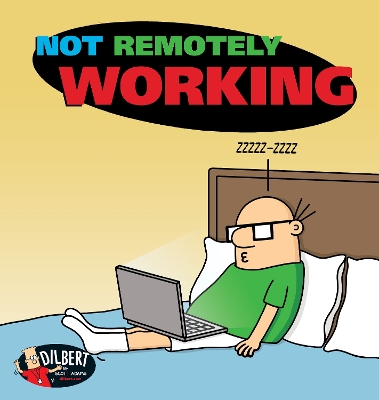Dilbert
16 primary works • 19 total works
Book 16
Since Dilbert was first syndicated in 1989, Adams has built a following that would be the envy of any corporate sales and marketing team. His work not only generates howls from readers as they rush to plaster it on lunch-room refrigerators and scan it into interoffice e-mails, it has those same fans reading about their workplaces every Sunday in a multiple-panel, color format. And that's what this treasury, The Collected Dilbert Sundays, provides. This collection offers yet another glimpse into the zany life of Dilbert, Dogbert, Ratbert, and the rest of the crazy cube crew through the masterpiece Sunday comics. Here's even more of the great Adams's irony, sarcasm, and satire that so many have come to depend upon to cope with the corporate workplace. The Collected Dilbert Sundays humorously continues the tradition of poking fun at the world of business from which we all seek to temporarily escape.
Book 18
Cubicle-dwelling business people the world over have been knowingly nodding, faithfully push-pinning their favorite strips to their cube walls, and--most of all--belly laughing out loud ever since Dilbert first arrived on the scene. In this collection, Excuse Me While I Wag, Dilbert and his look-alike dog, Dogbert, once again provide comic relief to anyone who has ever had to inhabit a cubicle, endure an "initiative of the week," or simply work in an office that has, on occasion, caused them to pull out large clumps of their hair. Scott Adams' dead-on humor in Excuse Me While I Wag is sure to satisfy the hordes of fans worldwide who avidly follow the misadventures of Dilbert, Dogbert, Catbert, Ratbert, the pointy-haired boss, and the rest of the cast of characters in Dilbert's world--a world that's eerily like the one we work in daily.
Book 19
When Dilbert first appeared in newspapers across the country in 1989, office workers looked around suspiciously. Was its creator, Scott Adams, a pen name for someone who worked amongst them? After all, the humor was just too eerily funny and familiar. Since then, Dilbert has become more than a cartoon character. He's become an office icon. In Another Day in Cubicle Paradise Dilbert and his cohorts, Dogbert, Catbert, Ratbert, and the pointy-haired boss, once again entertain with their cubicle humor. From bizarre personnel decisions to meetings gone bad, from schizoid secretaries to consultants from hell, Another Day in Cubicle Paradise provides a way to get all those darn comic strips off the breakroom bulletin board.
Book 20
What Do You Call a Sociopath in a Cubicle? Answer: A Coworker, Volume 20
by Scott Adams
Book 37
For more than 20 years, Scott Adams's Dilbert has chronicled the problem-filled work world of pointless projects, questionable employment practices, and interoffice politics that eerily resemble our own 9-to-5 cubicle existence.
In How's That Underling Thing Working Out for You?, Adams takes on the challenges of Elbonian sensitivity training, employee satisfaction surveys, confusopoly consultants, and more inside this new Dilbert book.
If you agree that every indeterminable project has to have at least one WDG (Worthless Dumb Guy), or are subjected to results-free sensitivity training, questionable employee surveys, and freelance consultants that seem to offer little more than exorbitant invoices, then chances are you find the corporate cubicle culture philosophy represented inside How's That Underling Thing Working Out for You? alive and well inside your own work environment--and that's exactly what makes Dilbert one of the most successful and popular comic strips of all time.
From Dogbert's invention of a beheading app to Dilbert's PowerPoint presentation that proves two monkeys could lead better than current management, How's That Underling Thing Working Out for You? chronicles corporate cubicle culture questionable training seminars and employee satisfaction surveys, along with made-up consultancies one Dilbert strip at a time.
Book 38
He's the icon of millions of corporate workers, the most popular cubicle dweller on this planet. He spends his days in endless meetings with incompetent supervisors, performing perfunctory tasks mixed with the occasional team-building, brainstorming, or management fad-of-the-day session. He has entertained us for more than two decades: He's Dilbert.
Created in 1989 by Adams, in his own cubicle as a doodle distraction, Dilbert has found a home in the workplace, this generation's home away from home. Adams amuses readers with his portrayal of the absurdities of this environment with unfailing accuracy and precision. As readers of more than 2,000 newspapers, millions of books, and the newly revamped Dilbert.com site know, the familiar mouthless character with the upturned tie, his dog, Dogbert, the pointy-haired Boss, over-achieving Alice and underachieving Wally, Human Resources director Catbert, depict a world that's all too easy to recognize, complete with shrinking cubicles, clueless co-workers, focus groups and ill-conceived management concepts.
In this all-new chronological collection, Adams further exploits the fodder of workaday life, making even the most cynical cubicle dweller laugh at our shared, absurd work lives.
Book 40
Book 41
In I Sense a Coldness in Your Mentoring, the on-going torture that The Boss wreaks on his helpless underlings is played out in full. From a total lack of mentoring skills to clueless budget requests and pointless mind-numbing endless meetings, The Boss makes office life for Dilbert, Wally, and Alice, not to mention his secretary, a living hell with cubicle walls.
Book 42
The strip's enormous popularity stems from the fact that its millions of readers easily identify with the crazy plots and wacky characters found within the corporate environment. Sure, most companies don't have a bespectacled engineer with a tie permanently curled up, a cynical talking dog, and a manager with two pointy tufts of hair. But it's the outrageous things Dilbertcharacters do and say that leave readers knowingly nodding their heads and, of course, laughing uproariously. The antics of Dilbert's cast are based not only on Adams's own corporate experiences, but on the numerous e-mails he receives each day about the office dramas of his devoted fans.
Book 43
It's an office code violation to be this good after so many years, but Dilbert keeps doing what he does best: passive-aggressively out-witting his superiors and exercising conflict avoidance. And he is so good. No wonder office drones and workforce automatons alike can't resist the cold embrace of Dilbert'sworkplace.
Book 44
I'm No Scientist, But I Think Feng Shui Is Part of the Answer
by Scott Adams
Dilbert, the cubicle-dwelling drone, is at his satirical best with this new collection of cartoons.
It’s an office code violation to be this good after so many years, but Dilbert keeps doing what he does best: passive-aggressively out-witting his superiors and exercising conflict avoidance. And he is so good. No wonder office drones and workforce automatons alike can’t resist the cold embrace of Dilbert’s workplace.
Book 45
When confronted by unjust systems of corporate domination, whenever and wherever they may be, Dilbert boldly . . . gets “re-accommodated.”
The legendary gang of coworkers is back for more unprofessional development, jargon freestyle, and elaborate work-avoidance schemes. Management fudges the line between stupidity and illegality. Promising new coffee warmer/phone charger technologies abound. And the circle of blame goes ever onward.
In this fresh collection, Dilbert lampoons cubicle culture with strips that are sometimes recognizable, sometimes absurd—but always hilarious.
Book 46
--San Francisco Examiner
Dilbert is the cubicle-bound star of the most photocopied, pinned-up, downloaded, faxed, and e-mailed comic strip in the world.
As fresh a look at the inanity of office life as it brought to the comics pages when it first appeared in 1989, this new Dilbert collection comically confirms to the working public that we all really know what's going on. Our devices might be more sophisticated, our software and apps might be more plentiful, but when it gets down to interactions between the worker bees and the clueless in-controls, discontent and sarcasm rule, as only Dilbert can proclaim
Book 47
--San Francisco Examiner
Dilbert is the cubicle-bound star of the most photocopied, pinned-up, downloaded, faxed, and e-mailed comic strip in the world.
As fresh a look at the inanity of office life as it brought to the comics pages when it first appeared in 1989, this new Dilbert collection comically confirms to the working public that we all really know what's going on. Our devices might be more sophisticated, our software and apps might be more plentiful, but when it gets down to interactions between the worker bees and the clueless in-controls, discontent and sarcasm rule, as only Dilbert can proclaim.
Book 48
The office culture in Dilbert abounds with hazards, from risky re-orgs and ergonomic ball chair disasters to Wally’s flying toenail clippings. After a colleague suggests planning a huddle to ideate around an opportunity, Dilbert suffers an acute bout of jargon poisoning. It’s all part of the delightful drudgery of Eagerly Awaiting Your Irrational Response.
Book 50
The COVID-19 pandemic has forever changed the way we go to work, but the satirical workplace humor of Scott Adams hasn't missed a beat. With the rise of Zoom meetings, remote work, and hybrid work schedules, there's so much more to make fun of in professional life these days, and no comic strip does it better than Dilbert.
The Office Is a Beautiful Place When Everyone Else Works from Home
by Scott Adams
No one is more accomplished at making the drudgery of office work into comedy than Dilbert creator Scott Adams, whose landmark comic strip starring the downtrodden engineer have entertained millions of readers for the past three decades.
This collection includes hundreds of the most recent Dilbert comics starring Dilbert, his pointy-haired boss, lazy colleague Wally, temperamental Alice, maniacal Catbert, and misguided intern Asok, among many others.
